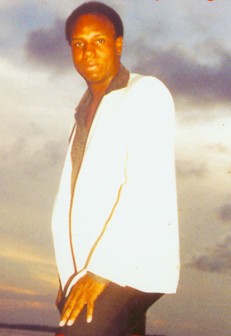Twenty-five years ago, though he had not yet experienced Mashramani, Rudy Grant sat down and wrote the now iconic “Mash in Guyana”, which remains the only song that is played around Guyana’s February 23 celebration every year, while calypso and soca songs come and go.
“Mash in Guyana”, now referred to as the unofficial anthem of Mashramani, describes how Guyanese celebrate their carnival-type activity and Rudy says he was able to describe them from various conversations he had with persons who would have taken part in the celebration.
It was in November 1986 that the late radio announcer Pancho Carew invited Rudy to Mashramani the following year. “Mash in Guyana” was born out of that invitation and it has withstood the test of time, and is still very alive and kicking 25 years later.

It was a rather reflective Rudy Grant who sat down with The Scene to talk about his song. He said while the years have flown, it feels like he had only written the song recently.
When he received the invitation from Carew, Rudy said, he was still living in England.
“I told him I don’t have a song and he told me to write one as the country was lacking good local songs,” Rudy told The Scene.
Hw sat down and wrote the lyrics and initially titled it “Mashramani in Guyana” but found that the word was too long so he shortened it to “Mash in Guyana”. The track was done with Errol Reid on keyboard; Eddie Hines playing sax; Jonesy on steel, Patrick Daniels arranged brass and Paul Brown and Alpine Grant were the engineers. Rudy said Wayne Nunes and a girl named Claire were also part of the team.
The back-up vocals were done by Jackie Robinson and Pauline and Maria Grant.
The song was originally recorded at Coach House Studio in England, which is owned by Rudy’s brother Alpine, given to him by another brother and singing sensation Eddy, but was mixed at Hollywood Studio also in the UK. It was then mastered at the CBS cutting room in West End, London. Errol Reid and Bertie Chancellor also played roles in the formation of the song.
Rudy said he cut a demo of the tape and sent it to Pancho Carew back in Guyana.
But the significance of the song did not register to Rudy until one morning when he listened to it in his car as he was driving.
“I just started crying,” he told The Scene.
Why?
“Because it was such a great song,” he answered.
Grant said veteran journalist Enrico Woolford also had a part in the formation of the song as he had visited him at the then GTV, now NCN, and Woolford gave him clips of past Mashramni celebrations. After watching these clips, Rudy said, he later took them to his friends Betty and Merville Lynch who were at the CBC television station in Barbados. It was this television station that later made the video for the song which included the clips of past Mashramani celebrations.
“Mash in Guyana” did not only make its mark in Guyana. Shortly after it was released it was named number one on the first soca chart published by Black Echoes, a black newspaper in England.
But it was not all smooth sailing for Rudy and his song as he was forced to battle it out in court with beverage giant Banks DIH over the ownership of the song and in the end he lost. Rudy, a fierce advocate for copyright law in Guyana, had taken the company to court after its advertising agents used parts of the song in an advertisement for Mashramani. Rudy said before this no one ever questioned the ownership of the song, but in court he was being told he did not write the song or produce it. He was forced to present a law from the Performing Rights Society which indicated that there was only one registered “Mash in Guyana”, which was done by him.
In the end, Rudy said, the judge ruled that while he was the writer of the song there was no proof that Banks had used the song in its Mashramani advertisement. A copy of the advertisement was taken to the court but was not admitted into evidence. The day the ruling was given was the only day Rudy was not in court and he still looks back at that day with some amount of sadness as he learnt of the decision when he was approached by a stranger on the street.
“It was a hard decision to accept,” Rudy said, adding that he “never thought that the nation would have sat back and allowed this to happen and no one said anything but I guess it is because I was up against a big giant.”
The experience has left a “bitter taste” in Rudy’s mouth and he said since then he has not recorded much, as in Guyana it is difficult to protect one’s work and no one is talking about copyright in Guyana.
“‘Mash in Guyana’ taught me that it is more than singing and putting music out there…” Rudy told The Scene. Shortly after that decision, he was forced to once again approach the court when designer and advertising executive Bernard Ramsay used the song in his work without permission. He said that shortly after the court matter started Ramsay migrated and as far as he knows that matter is still ongoing.
Rudy noted that music is very important unlike what many might say and opined that music was centrepiece of the campaigns of the various political parties during the run up to last year’s elections.





